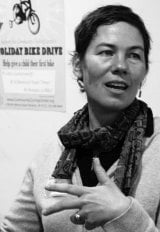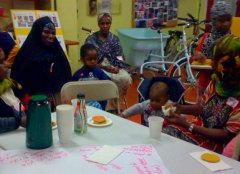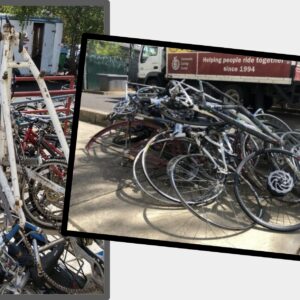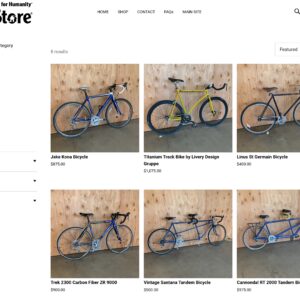“The people riding and making decisions about bicycles is a white, middle class group.”
— Alison Hill Graves, Community Cycling Center
The staff at Community Cycling Center, a 15 year old Portland-based nonprofit that aims to increase access to bicycling, has been doing some soul searching in the last few years.
In the process, community and programs director Alison Hill Graves says they started looking around the area they serve (a five-mile radius around their NE 17th and Alberta retail shop). “We saw a big divide in terms of who’s riding bikes and who isn’t.”
Or, to put it more plainly, “The people riding and making decisions about bicycles is a white, middle class group.”

The result: The CCC is undertaking an initiative it calls Understanding Barriers to Bicycling. The effort is funded by a grant from Metro that comes with a social justice stipulation.
Their first step in the process was to spend much of 2009 meeting with area leaders and organizations, particularly those that represent African Americans, African immigrants, Latinos/Hispanics, Native Americans, and Asian Americans. CCC staff told the groups about their work, and then asked questions about what might be preventing people from riding bicycles.
What they learned was eye opening, Graves said. “Affordability is a big barrier. But we also started hearing some deeper cultural, more challenging concerns, like that bicycling is an activity for white people or for Americans.”
“There’s the conversation about women going into bike shops and being intimidated. Think about being an immigrant… that option would never occur to them.”
Language and class both pose significant barriers. “There’s the conversation about women going into bike shops and being intimidated. Think about being an immigrant. We had conversations with people about where they’d buy a bike and they wouldn’t even think of going into a bike shop, that option would never occur to them.”
The CCC also commissioned two literature reviews — one on transportation and underserved groups, and one on community health initiatives — and sought out local histories and stories that would help them understand the experience of immigrants and people of color in Portland. All are available on the project web page, which they will continue to add to.
Their next step, already underway, is a series of community open houses and outreach events that will give them a chance to talk with more individuals about why they do or do not ride bikes.
Grants from Metro and REI will fund two pilot projects that will begin in 2010, each in conjunction with an affordable housing community — Hacienda CDC in the Cully neighborhood, and New Columbia in Portsmouth.
What the projects consist of will be guided by the relationships and lessons derived from this year’s outreach.

their perspective at a meeting last week.
(Photo: CCC)
For example, “Somali women [we talked to] would ride with their kids, but don’t know how,” said Graves. The CCC could help with meeting these educational and equipment needs — “And we need to work with the city to make sure the Cully cycle track gets installed.”
In other conversations, Graves said, Latino/Hispanic people have said that their biggest barrier to bicycling is that they don’t know the rules and are afraid of being pulled over.
The exact pilot programs will be determined in early 2010, and be implemented that summer. Graves said she wanted it to be clear, however, that she sees this as not just a grant funded project but “a long term thing. It’s not a program we’re going to start and maybe stop some day — it’s really the future of the CCC.”
Part of that will mean organizational change and educating the CCC’s own staff. “It forces us to think about how do we create an inclusive environment here? It pushes us internally as well. There will probably be some kind of facilitated, ongoing learning process.”
And Portland as a whole may need to grow in this direction as well. “I think we have a lot of work to do to make bicycling more inclusive,” Graves said. “I think while there’s a lot to be proud of there’s a lot of work to do, and that means sharing information, resources, and connection. And it means everybody thinking about equity.”
– Also worth reading is a recent discussion on Streetsblog on the issue of mobility as a basic human right.







Thanks for reading.
BikePortland has served this community with independent community journalism since 2005. We rely on subscriptions from readers like you to survive. Your financial support is vital in keeping this valuable resource alive and well.
Please subscribe today to strengthen and expand our work.
This type of outreach is needed. Bicycle Colorado now makes their Safe Routes info available in Spanish. I’ve seen Chinese language bike promotion in San Francisco and I’ve heard of similar efforts around the country.
I think that’s really great – transportation is really a major social justice issue, and it will be really good to see people actually looking into how to overcome barriers to providing a cheap and sustainable form of transportation to anyone in the city. I hope that others in the “bike scene” will be welcoming and want to help out – not in a condescending “we can help you” kind of way, but just a “bikes are great tools, here’s how you can use them” kind of way. Sounds exciting.
I think that “is our bike scene too white?” is kind of a specious question.
The focus of this effort is 1)facing that fact that there are barriers to access for members of our community; and 2) crafting solutions to eliminate them.
As outlined, these barriers are many and it isn’t as simple as white/non-white.
The key ideas I take away from this post are “we have a lot of work to do to make bicycling more inclusive,” and “it means everybody thinking about equity.”
Needless to say, this is some exciting work being undertaken by CCC, Hacienda, and New Columbia. And it does make me thinking about what I can do on a personal and political basis to create a more inclusive and equitable transportation system.
Ha! you’re looking for a more diverse community? you’re not going to find it in pasty white Portland, Oregon…
Try DC…or NYC…anywhere in the SE?
Bahueh: diversity in the SE (assuming you mean SE USA). You’re joking right? Diverse communities in the South?
It is worth noting that there are often underlying barriers to doing things differently than our parents. In recreation, it is as statistically rare for a member of a minority to, say go camping, as it is for me (a white guy) to take up some sport that is wildly popular in an immigrant population.
The BTA has made a point over the years to connect the dots between the (at least partly) recreational “joy” of youth cycling and adult riding. For anyone that does not have that background, there is a lot of work needed to make it approachable and perhaps more importantly, fun.
This surprises you?
By Blaine Harden
Washington Post Staff Writer
Monday, June 19, 2006
PORTLAND, Ore. — Already the whitest major city in America, Portland is rapidly becoming even whiter at its core.
“The heart of the black community is gone,” said Charles Ford, 76, a black activist whose neighborhood in Portland has flipped in recent years from majority black to majority white. “There ain’t no center anymore.”
About 150 miles north in Seattle, the nation’s second-whitest major city, the same process of downtown demographic bleaching is accelerating for the same reasons.”
Also, let’s not forget that the bulk of Portland’s bike infrastructure dollar is spent in wealthier, whiter, close-in neighborhoods.
Ex: Along inner-SE Hawthorne there is a N/S bikeway every ~7 blocks; but once you hit the other side of Mt. Tabor it drops quite dramatically…. then once you get past I-205 you’re basically in a bike infrastructure desert.
Portland is great if you’re one of the “haves” but if you’re a “have not,” then you’re pretty lucky to just get a sidewalk!
The people riding and making decisions about bicycles is a white, middle class group.
cycling isn’t inherently a “white”, “middle class” or “american” activity. i see people of color on bikes all the time. given portlands’ predominant whiteness it’s not a shock that the majority of cyclists are white and for sure, fewer of them are minorities. what sort of percentage split would make everyone happy? what is the specific goal of all this? what sort of changes would we supposedly see if more minorities were involved “the decisions” graves talks about? what “decisions”? cycling infrastructure?
not trying to rain on any parades, i want more cyclists on the road too. i don’t care who it is. this just has warm and fuzzy p.c. overtones that seem odd to me. it’s cycling. you just get on a bike and ride…
sabes #5
Diverse communities in the South?
Um, yes. Lived down south. Actually saw LESS bigotry in South Carolina than in New England, the mid-west, or southern California. I’d say that has to do with awareness of the problem. This lead to educational programs that have helps the undecided and marginalizes the hate groups.
Self-segregation of communities seems much more defined here as if lines were drawn on a map.
funny, i see a lot of latin riders out where i live who don’t give a damn about the rules of the road. no lights, riding against traffic, the list goes on
I think the outreach is positive. People don’t ride for many different reasons, and the more we as a society understand, the more people we can encourage to ride.
One reason some ethnic groups ride less that I did not see mentioned yet (probably because it is a stereotype) is obsession with image. As in, obsession with fancy clothes and cars, even if you can’t afford such. These people don’t want to be seen on a bike.
It is ironic, given how obsessed your average white American is obsessed with image, but some other groups, on average, do appear even more extreme. Fortunately, in all groups, the obsession seems most acute with teens and young adults, and then gradually lessens with age and maturity.
I guess the solution is making cars uncool to young adults. If only that were easy.
I teach in North Portland. I also ride my bike around in between schools.
There must be people of color in Portland, cause the schools are full of their kids (including my son).
I see black people riding around the North Portland everyday.
I do commend any effort to reach out to anyone.
This is remarkably important! Kudos to CCC for taking this on.
Certainly, Portland has a small African American population, so almost anything in this city is going to appear overwhelmingly white, but this issue is prevalent throughout our country.
In Philadelphia, which is almost 50% black, there is a similar problem with larger scale adoption of bicycling as a practical means of transportation. But race may be just the symptom. Class, culture, and location are factors.
I’ve been cycling for 20+ years and my Asian parents are puzzled why I own $20k in bikes, when I own a perfectly fine running $20k car. I recall my mom being more worried about me riding my bike more than me driving my car. Yet in Asia, she shuttled me as a baby all over town on a bike harnessed to her with just a scarf and no helmet!
Cycling in Asia, for example is considered normal. But here in the US, Asians consider other Asians who ride bikes as poor, and those who drive are wealthy Asians.
So for US Asians, at least, it’s more cultural perception.
On a side note: started racing CX this season and am always conscious about how many Asians cycling. I think I am the only Vietnamese racer of the 1500+ riders this season so far.
Keep up the good work Alison!
this is an ironic article on bikeportland given the amount of press/fawning over $3000+ dutch cargo bikes and “velocouture” worship (barf). custom hand-made shoes, wool knickers and tweed blazers are alienating, annoying, and unnecessary aspects to cycling imo. and i’m obsessed with cycling. imagine what that crap looks like to an outsider.
While we’re at it why not get a grant to take some minorities snowboarding or camping. Maybe we can get more minorities into hockey as well. What a waste of money.
tent #14, what a waste of money? What are you talking about although I think I know. Minorities just can’t be into riding bikes can they? What a bigoted moron. Do articles like this just bring the neanderthals out of the woodwork?
Were bike shops ever intimidating to anyone else?
There are great psychological barriers to bike shops that go beyond cultural divides
The tight cluttered layout, the abnormally dark lighting (compared to a Walmart, Best Buy or any successful retail store), the confusing ranges of qualities of parts vs cost (browse the Shimano site for just mountain bike parts) and the overall higher prices are enough to chase off determined customers.
The customer service might me dynamite but the employees are usually cycle fanatics first, mechanics second, business managers third and then maybe sales people. That level of expertise, passion, knowledge and experience strikes fear in normal people; imagine the feeling you have when your car mechanic or IT/web guy calls you back before he said the work would be done to tell you …. ____. Fill in your fear.
You’re at the mercy of the techie, the elite, who probably is not an elitist but looks and sounds like one. You have never spent more than $200 on a bike and can see no reason why a mid range bike, that does the minimum of what you are asking for, should cost greater than $1000.
I won’t argue that cultural problem exist, being a white male of European descent, but I do think problems start when immigrants buy in to the “American Dream ™” that says having a car proves success.
Besides, aren’t white people about to be out numbered as a nationwide demographic?
Good lord, another bigot! Q’ztal, bike stores are too confusing for non-white people! Am I in the 1950’s deep south here? WTF! We have a small minority population here, I don’t think the numbers of riders are out of the norm for the percent of the population. The responses here are mind numbing! I don’t even know how to respond to statements like these! This is embarrassing!
Most people outside the Portland bike bubble are not eager to spend a whole lot of money on a bike when bikes here are overpriced. Plus, if you have generations of people who are accustomed to car culture in some way (or come from a background where bicycle = poor), you’re already steps behind on helping someone.
Portland’s not exactly a place I like cycling in. The weather sucks so you have to spend money on water-resistant gear, plus the topography is kind of crazy. I’m glad I live in the middle of town as opposed to 82nd or so… though I’d have more access to normal people food.
Not quite sure what’s the point. Is it a matter of “the man” keeping people from riding bikes or could it be that they just don’t want to. Riding a bike isn’t exclusionary at all. It is cheaper than owning a car isn’t it. I suppose extreme guilt drives people to create causes to fight for. I just hope they put a bike lane along cesar chaves ave.
I’m supporting Max
If you live in a poor neighborhood, you are lucky to get stop signs, sidewalks, street sweepers. I like the idea of multi-lingual maps, guides and signage, that’s easy enough. The concept of ‘outreach’ and ‘barriers to cycling’ are idiotic inventions of persons who work in the non-profit and government sectors. If you are Somali, Dutch, Salvadorian or Chinook, if you want to ride, you ride. If your body tells you your bike should, for example, not have the BB so far forward and handlebars so high, you get a different bike. Bicycles are cheap and even good bikes are cheap compared to things with petrol engines.
I have never heard of a customer feeling intimidated in a bike store who did not have self-confidence deficits going in. Were they unprepared for questions like ” what kind of riding do you want to do, or what’s your budget?” Am I blaming an innocent victim? set me straight. It’s ok to say ” I’m having trouble communicating with you, may I please speak to a different sales representative”
This is very important work. Props to the CCC.
Sounds to me as though the people at CCC have done some good work in seeking to explore whether cultural barriers may be keeping more people from riding. I can understand anxiety about dropping into a bike shop to buy or get information.
To someone unfamiliar with bike technology and accessories, walking into a bike shop blasts you with a dazzling array of those things that can be overwhelming. It can take a while to make some sense of all you see. Add language and cultural issues into the mix, and it makes sense some people would just prefer to walk or take the bus.
Out here in good ol’ Beaverton…Central Beaverton at least, there’s quite a lot of ethnic diversity; Koreans, Chinese, Hispanics, Arabs… . Many Hispanics live right across the street from me. Some of them ride, but lots more walk. Having more of them ride might really help support the sense that more and better bike infrastructure is needed now. What I sense though, from observing great numbers of kids get off the school bus at the end of the day, is that many of them are already focused on the great American path to success consisting of car ownership and dependence upon one for getting where they need to go.
Yeah, the headline is a white-guilt eye-grabber. The question is really Why don’t more Portland minorities ride bikes?
old&slow: you are definitely pulling what you want to see out of tent and q’tzal’s comments. tent is being sarcastic. and q’tzal is clearly, to me anyhow, stating that bike shops can be intimidating to everyone.
i don’t know why you didn’t call out schrauf for his statement (though i think he’s just acknowledging the elephant in the room) when he said lots of people, ethnic groups, minorities, any number of sub-cultures, whoever, are obsessed with image (hip hop, i love you, since the first time i heard the older skater kids on my block playing Slick Rick when i when i was in third or fourth grade, but i’m looking straight at you. so many of the facets of your culture are self-oppressive and unhealthy it’s absurd.)
Good work reaching out to those who do not already ride.
Cycling is not only too white – it is too hip, too young and too urbane. Outreach to middle class, middle aged suburbanites anyone?
Sometimes the biggest barrier to riding is not infrastructure, cost or accessibility = it is cultural. Do people who I identify with ride? If the image of cycling is tattoos, dreadlocks and spandex, those who do not see themselves like this have difficulty seeing themselves on bikes.
“Graves said she wanted it to be clear, however, that she sees this as not just a grant funded project but “a long term thing. It’s not a program we’re going to start and maybe stop some day”
They have a history of making commitments and then pulling out. We’ll see how long this lasts.
This is the most relevent story I’ve seen on this site for a while. It’s ok that the conversation is a little divisive. It’s about image, class, race, culture, historical precedent, access, and more. In the end it is a story about equity in America. Equity in one of the whitest major metropolitain areas in America. As the best bicyling city in the US, Portland has a mandate and the responsiblity to lead in efforts to create equitable opportunities for people of all walks of life to connect with bicycling. Thanks to the CCC for doing the work and thanks to J Maus for covering it-
Anything that gets more people on bikes is good for everyone.
Funny, when I lived in San Francisco in the early 1970’s you could have asked “Is cycling in SF too Hispanic and Asian?”
Is it actually a problem/issue? Do we have any numbers indicating that there is a smaller percentage of minorities riding than whites? I realize there seem to be far more whites riding, but as a percentage of white population? For example: 10% of 400000 (40,000) whites vs 20% of 100000 (20,000) minorities. Those numbers tell me that not enough caucasions ride.
I would also be interested in how and where the data was collected. Hawthorne Bridge or SE 122 and Powell? Please don’t tell me this is based on BTA or Local Bike Shop data.
And lastly- why is it eye opening that that so many people don’t want to drop a grand to get into cycling? Go to your LBS and asked to get outfitted for bike commuting. Eye opening would be all the “necessities” required for commuting and what they cost.
old&slow #21
Good job on the name calling and mud slinging!
As a white male, “The Man”, I have no moral imperative to comment on the suffering that I have not observed to other cultures and races.
I have no reason to believe that it does not happen everyday.
If being a white male and having no direct experience with cultural or racial problems makes me a bigot then I have no idea how to fix it.
What I do feel I can comment on, in relation to this issue, is what any human being feels when approaching what is an self-isolated social group from the outside.
As a mostly white cycling community we have ensconced our transportation mode in fun and goofy activities; activities that look stupid and dangerous to people outside this social clique. It keeps us separate and thus we can’t be part of the community as a whole.
As for the bike shops: look up any book on modern store design. There is no niche market that benefits from the stereotypical look of a bike shop. Circuit City looked similar in the early 1980’s but changed because they wanted business from customers that weren’t just audiophiles. The current bike market look, for medium to high end bicycles, is aimed at the bike-o-phile. I’m don’t think bike shops can afford to make their “stores” like airport concourses but some changes could directly influence sales.
Get people hooked on non-toy bikes from an economic standpoint: it is much cheaper to maintain a repairable bike than a junk bike. Thus begins the process of “ownership” and “pride” in a much more fiscally responsible mode of transport.
http://www.newgeography.com/content/001110-the-white-city A great article from new geography that fits in with this discussion about how many “progressive” cities have little diversity.
Good grief talk about liberal guilt (this coming from a liberal.) “Affordability”???? Your kidding right?
Cycling is not only too white – it is too hip, too young and too urbane. Outreach to middle class, middle aged suburbanites anyone?
the image of cycling may be all that, but it’s not cycling itself. cycling is cycling. the barriers to get people on bikes make no matter if white, black, latino, asian, etc. you will bike or you won’t. there are not enough people on bikes in general. but what bugs me about super p.c. things like this is it looks to me like; hi, we’re white people who do this thing that is really a better life choice, we’re gonna help all you brown people get on board, ok? we’re gonna make everything all better, don’t you worry.
bike lanes see no color.
memo: so should white portlanders feel like crap because of historical migration patterns of african-americans post-slavery?
the end of that article says we portlanders should feel no pride for the city and policies we’ve built as there aren’t enough minorities here. crap. so i guess that means we can just pack it up, most of you here can head back to the upper midwest and east coast, i’ll drag my ass back over to vancouver. it’s been fun, but way too white. so it goes. fail. if only there was a way to round up people of color, bring them here and let them serve our needs so we can feel good about everything.
Quit trying to shame people on race issues, and get back to shaming them on environmental issues, pronto!
I repsect the effort, but PDX and the region for that matter is white as snow.
Talking race is always difficult. In a town as “progressive” as Portland, we tend to think we are beyond those issues, but our homogeneity simply means that they are easier to ignore.
There is room for a rational discussion of whether this is a valid study or use of resources, but I doubt that it will happen. Instead it will be mud-slinging between “racists” and “PC white guilters”. Sigh.
Having worked in bike shops in some pretty poor towns, I think it’s a class issue that keeps people from riding more than a race issue.
Riding takes time, and when you work at a non-livable wage job, there isn’t much extra time. Factor in split-shifts and graveyard shifts too.
Riding takes money. People buy the only bike they can afford: big-box junk that becomes unrideable (and often unfixable) after 6 months. Even when they work, they are slow, uncomfortable and brake so poorly they are frightening to use. (I always wore my helmet when test riding a customer’s Magna).
If these hurdles could be overcome, I think you’d see a lot more diversity in the cycling population.
Like, for instance, the government offering a sizable subsidy for people to buy bicycles? Other countries do it…
Equality does not equal sameness.
Even with equal infrastructure, I would not expect equal behavior between different cultures.
One of the biggest failings of the ‘diversity’ movement is to realize that diversity = difference.
To me, this seems like an extension of white values onto other cultures.
Ironic that the study is being led by a white woman.
CCC board of directors seems pretty white, too:
http://www.communitycyclingcenter.org/index.php/about-us/board-of-directors/
If it works,it works. If it don’t work,it don’t work.
The goal of getting a wide cross section of a community involved in something is when it works for them. Distinctions of race/age/class are meaningless compared to the true yardstick: it makes more sense to do this than do that.
I look at the European attitude that I am a ( fill in the blank) that rides a bicycle because it makes more sense. I am not a cyclist,per se.
When we get ‘there’, we will have figured it out pretty well.
Good points! I definitely agree on class issues-those of us who do physical work may not have any juice left for riding. And if the idea is to get everybody on bikes someone might want to start making affordable rides for people with mobility/physical problems-trikes, quads, hand powered,etc. Even minor owies that won’t keep people from driving can make biking impossible. Maybe there’ll be a shift in consciousness once people start getting older and body parts begin malfunctioning.
I agree Joe that we’re getting there. Very slowly, but we’re getting there. I live in inner NE, go to City Bikes a lot. Last week I went to CB to check out a couple of things and was approached by a couple of Latino gents halfway down the block. One of the fellows needed a tube to repair the bike that he rides down to the day laborer site on the corner. They sheepishly asked me(in Spanish, I’m Mex.-Amer.) if I could buy it for them. Even though they spend every day at the opposite end of the block, they we’re too intimidated to go into City Bikes.
Yeah it sucks that they feel that the bike shop wasn’t for them, but on the other hand, it’s great that the guy was riding everyday. His bike is his transport.
Oh and to Odd(#12); funny, I see tons of white folk in my neighborhood(again inner NE) who don’t give a damn about the rules of the road, riding without lights, against traffic, etc. Hmm, maybe it’s not just a Latin thing. And it’s definitely not worth getting worked up about.
Interesting debate to have that’s for sure. I know in some of the more cycling friendly countries in Europe this debate is happening as well. As one earlier poster pointed out; for immigrants cycling is seen within their peer groups as poor and sub-standard. They expect affluence to be associated with the auto only, especially now that they have moved to a more “affluent” nation. So, I don’t think this is unique to PDX or even the US at all. It’s a cultural hurdle no matter where we are.
As for alienation, the performance clothing and uber-macho urban warrior image does more to alienate others from riding than does race. One step to making cycling more appealing to all folks, of all races/cultures is to make it less of an extreme sport and more about transportation.